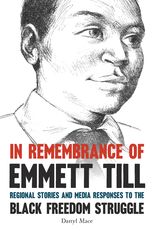In Remembrance of Emmett Till: Regional Stories and Media Responses to the Black Freedom Struggle
In Remembrance of Emmett Till: Regional Stories and Media Responses to the Black Freedom Struggle
Cite
Abstract
Amid general unification behind anticommunism, Emmett Louis Till's 1955 lynching engendered regional stories and illuminated racial dispositions that placed center stage all the vitriolic hatred that remained as a legacy of slavery, segregation, and white supremacy. Chronicling events surrounding the lynching, regional press coverage of the Till saga marked a response to people's views of the place in which they lived and how their locale compared to the rest of the nation. Using regionalism as a lens, this book provides a textual analysis of press coverage of Emmett Till's lynching. The regional press strategically highlighted aspects of the Till saga that best framed their perspective on American race relations, and, through their letters to the editor, readers both supported their local papers' coverage and challenged the staff to intensify their reports. Even with the horrific nature of the crime and the national climate after the 1954 and 1955 Brown v. Board of Education decisions, Till's death would not have garnered the attention it received were it not for his family, the black press, and civil rights organizations. Mamie Till-Mobley allowed the world to see gruesome images of her son, and civil rights organizations and black news outlets lambasted the state of Mississippi for the crime. The Emmett Till saga struck a chord for many who followed the saga through the pages of regional and national publications, and, unwilling to let his brutal murder go unchallenged, they leaped into the burgeoning modern civil rights movement and formed the Emmett Till generation.
Sign in
Personal account
- Sign in with email/username & password
- Get email alerts
- Save searches
- Purchase content
- Activate your purchase/trial code
Institutional access
-
Sign in through your institution
- Sign in with a library card Sign in with username/password Recommend to your librarian
Institutional account management
Sign in as administratorPurchase
Our books are available by subscription or purchase to libraries and institutions.
Purchasing information| Month: | Total Views: |
|---|---|
| October 2022 | 2 |
| November 2022 | 3 |
| November 2022 | 4 |
| November 2022 | 6 |
| November 2022 | 2 |
| December 2022 | 2 |
| January 2023 | 1 |
| January 2023 | 1 |
| April 2023 | 4 |
| April 2023 | 3 |
| April 2023 | 1 |
| April 2023 | 2 |
| April 2023 | 1 |
| June 2023 | 1 |
| June 2023 | 2 |
| June 2023 | 1 |
| June 2023 | 3 |
| July 2023 | 1 |
| July 2023 | 2 |
| August 2023 | 2 |
| August 2023 | 2 |
| October 2023 | 1 |
| October 2023 | 1 |
| October 2023 | 3 |
| October 2023 | 1 |
| November 2023 | 3 |
| December 2023 | 2 |
| December 2023 | 1 |
| February 2024 | 2 |
| February 2024 | 1 |
| March 2024 | 6 |
| March 2024 | 3 |
| March 2024 | 8 |
| April 2024 | 2 |
| April 2024 | 1 |
| April 2024 | 1 |
| April 2024 | 2 |
| April 2024 | 2 |



Get help with access
Institutional access
Access to content on Oxford Academic is often provided through institutional subscriptions and purchases. If you are a member of an institution with an active account, you may be able to access content in one of the following ways:
IP based access
Typically, access is provided across an institutional network to a range of IP addresses. This authentication occurs automatically, and it is not possible to sign out of an IP authenticated account.
Sign in through your institution
Choose this option to get remote access when outside your institution. Shibboleth/Open Athens technology is used to provide single sign-on between your institution’s website and Oxford Academic.
If your institution is not listed or you cannot sign in to your institution’s website, please contact your librarian or administrator.
Sign in with a library card
Enter your library card number to sign in. If you cannot sign in, please contact your librarian.
Society Members
Society member access to a journal is achieved in one of the following ways:
Sign in through society site
Many societies offer single sign-on between the society website and Oxford Academic. If you see ‘Sign in through society site’ in the sign in pane within a journal:
If you do not have a society account or have forgotten your username or password, please contact your society.
Sign in using a personal account
Some societies use Oxford Academic personal accounts to provide access to their members. See below.
Personal account
A personal account can be used to get email alerts, save searches, purchase content, and activate subscriptions.
Some societies use Oxford Academic personal accounts to provide access to their members.
Viewing your signed in accounts
Click the account icon in the top right to:
Signed in but can't access content
Oxford Academic is home to a wide variety of products. The institutional subscription may not cover the content that you are trying to access. If you believe you should have access to that content, please contact your librarian.
Institutional account management
For librarians and administrators, your personal account also provides access to institutional account management. Here you will find options to view and activate subscriptions, manage institutional settings and access options, access usage statistics, and more.